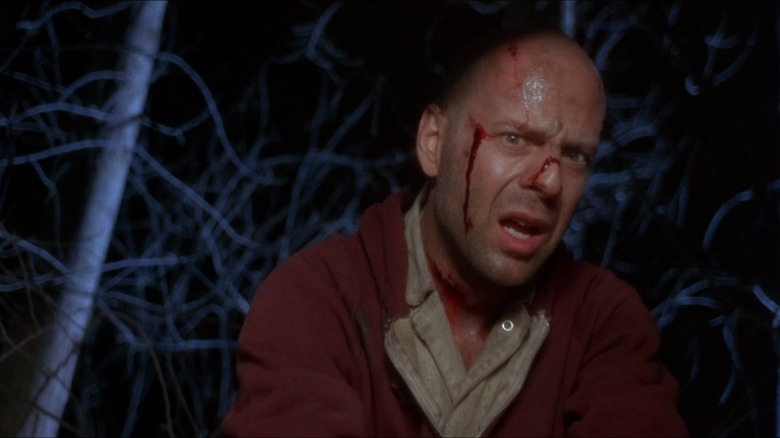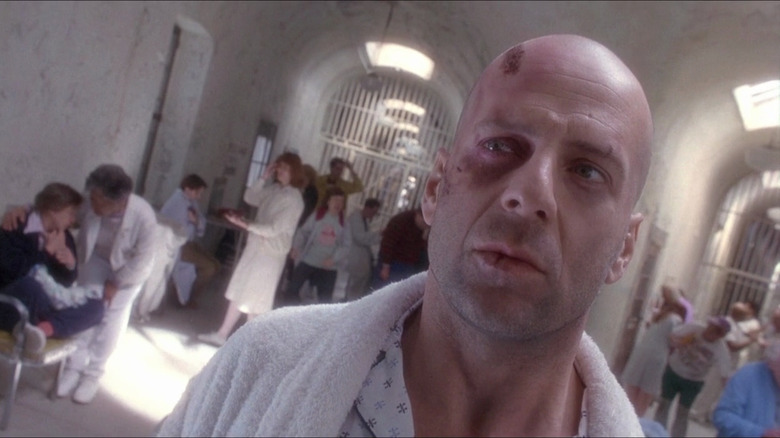Bruce Willis Tried To Avoid This 12 Monkeys Scene

Terry Gilliam’s 1995 science fiction thriller “12 Monkeys” is a gritty, challenging time-travel film with a bleak ending that reinforces humanity’s failures, so it’s no surprise that there were moments star Bruce Willis objected to during filming. After all, this is a film where Willis’ character Cole is sent throughout history, stripped naked and hosed down, and treated like a combination savior for humanity and human lab rat by the people in charge in his own time. After a super virus released by an animal rights terrorist organization forces all human survivors underground (literally), Cole is tasked with going back in time to try and stop the virus from ever being released. In typical Gilliam fashion, nothing goes well for our hero, who finds himself confronted with the pure existential horror of time loops.
In an interview with The Hollywood Reporter for the film’s 25th anniversary, Gilliam revealed that there was one specific scene where he and Willis butted heads, and it’s not one that you would expect. Instead of being concerned about onscreen nudity, emotional vulnerability, or the bizarre surroundings during the scenes that take place in a mental hospital, Willis was worried about whether or not Cole could take a kick to the face.
Bruce Willis tried to avoid getting knocked down
Willis has a complicated reputation when it comes to collaborating with directors, with Kevin Smith notoriously saying it was “soul crushing” to work with the actor on the comedy “Cop Out.” Fortunately, it sounds like Willis and Gilliam had a slightly more copacetic working relationship. There was just one thing that the two really disagreed on, according to Gilliam:
“There is a moment when he has kidnapped Madeleine [Stowe] and they are out in the woods and he’s been running away from Christopher Plummer’s house and escaping the cops. And he opens the trunk and she kicks him in the face with her high-heeled shoes and he said, ‘I wouldn’t go down.’ I said, ‘F*** off, Bruce!’ (Laughs.) ‘You’d go down!’ He said, ‘No!’ That was one of the funnier moments. The stunt guy said, ‘Yeah, Bruce, you’d go down.’ And he said, ‘No, I wouldn’t.’ I said, ‘You’re not John McClane, f*** off!’ He just went off and sulked by a tree and I just carried on shooting on without him and finally he came back. ‘OK. Yeah I’ll do it. It’s bulls***.’ That was really the only difficult moment. The rest of the time, I just thought he was on fire. He was just so good. And surprising all the time.”
It’s not hard to imagine Willis being a bit stubborn about his character looking cool and taking hits, especially after his action movie stardom, but it’s also not hard to imagine Gilliam swearing at him about it and finding the whole thing ridiculous either. Thankfully, they worked it out and Willis went with his director’s wishes. Honestly, if anyone was going to know whether or not Cole would go down, it’s the stunt guy. Stunt people are the unsung heroes of so many movies, and perhaps even in helping “12 Monkeys” get finished with Cole’s face-kick intact.
Bruce Willis, 12 Monkeys, and legacy
Look, if you haven’t seen “12 Monkeys,” you absolutely should. It’s a classic that has inspired all kinds of works (including a character from “The Umbrella Academy”). Plus, there are spoilers out here on the internet, so you should really try to experience it without them. It’s one of Willis’ best roles and a damn fine movie besides, with a truly killer performance by Brad Pitt — playing a deeply mentally ill animal rights activist who wants to rid the planet of humans so animals can rule — in addition to Willis’ heartbreaking performance as Cole. Add in all of the great visual oddities you expect in a Gilliam flick and a truly imaginative screenplay by Gilliam, Janet Peoples, and David Webb Peoples, itself adapted from the 1962 short “La Jetée,” and you have one impressive film.
Seriously, “12 Monkeys” was one of the movies that made me fall in love with movies, alongside Ridley Scott’s “Blade Runner” and Danny Boyle’s “Trainspotting.” It’s a sci-fi classic for the ages that only feels more and more relevant as time goes on.
Source link






